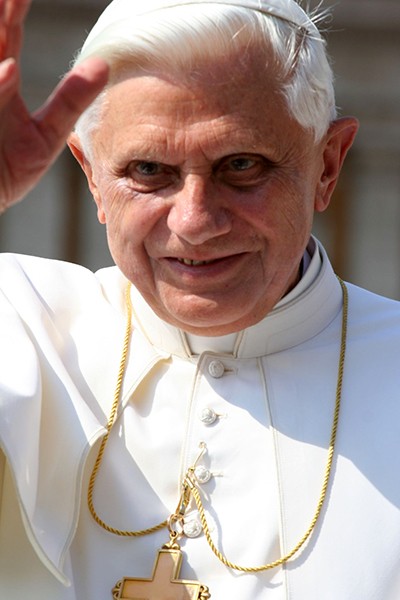GERMANY – On December 31, 2022, Pope Emeritus Benedict XVI passed away. He was 95 years old.
Joseph Aloisius Ratzinger (b. April 16, 1927) became pope of the Catholic Church on April 19, 2005, and served in that role until his resignation on February 28, 2013. A profound theologian, he demonstrated a significant understanding of the Lutheran tradition and its witness to the Gospel.
The International Lutheran Council’s (ILC) former Chairman, Bishop Hans-Jörg Voigt of Germany’s Independent Evangelical Lutheran Church (Selbständige Evangelisch-Lutherische Kirche – SELK), provides the following reflections on the legacy of Benedict XVI.
Lutheran Reflections on Benedict XVI

Jesus Christ was the spiritual theme of the life of Pope Benedict XVI. He will go down in the history books as one of the greatest theological thinkers of the 20th and 21st centuries: Joseph Ratzinger—Roman Catholic priest, professor of theology, Archbishop of Munich-Freising, Cardinal, and eventually Pope Benedict XVI. He died on New Year’s Eve, December 31, 2022, at his home in the Vatican at the age of 95. He was head of the Catholic Church from 2005-2013—the first German pope in 482 years.
In my opinion, Benedict’s three volume series on the life of Jesus—Jesus of Nazareth, which made it to bestseller lists around the globe—is among his most important work. Until their publication, the so-called “historical Jesus” and the “Christ of faith” had been increasingly driven further apart. Historical researchers held the opinion that only the “historical” Jesus could be researched. Statements of faith about Jesus Christ, however, were held to be only “congregational formations”—i.e., faith narratives of the first Christian congregations.
Ratzinger pointed out with the sharpness of his philosophically learned mind that this separation between historical research and faith must lead astray, since the divine Logos became flesh (John 1:14). “When we say these words, we acknowledge God’s actual entrance into real history,” says Ratzinger in the first volume of his Jesus trilogy. In this way, he shows both the limitations and importance of a purely historical method of interpreting Scripture: it attempts to reconstruct the historical contexts of a text and its original meaning in as much detail as possible. This is its value. When the divine Word has become flesh, however, it carries a surplus of meaning that must claim historicity and yet eludes historical comparability.
In this context, Ratzinger also reflects on the inspiration of the divine Word. A biblical author does not speak as a private subject, Ratzinger writes, but “he speaks in a living community… which is led forward by a greater power that is at work.” In his brief contribution to a survey by Christian philosopher Robert Spaemann on the topic, “Who is Jesus of Nazareth – for me?”, Joseph Ratzinger writes: “I trust the tradition in all its breadth. And the more reconstructions I see come and go, the more I feel strengthened in this trust. It becomes increasingly clear to me that the hermeneutic of Chalcedon is the only one that does not have to interpret anything away but can accept the whole.” (The Council of Chalcedon in 451 elaborated the doctrine of the divine and human natures of Jesus Christ as inseparable and unmixed.)
Joseph Ratzinger here comes remarkably close to the Lutheran theologian Hermann Sasse (1895-1976), who applied the two-natures doctrine of the Council of Chalcedon to the doctrine of Scripture: “The revelation in the Word becomes the incarnation. Therefore Jesus Christ, the Word (Logos) become flesh, is the revelation of God in this world. Only in Him, the eternal Word, does God step out of His hiddenness…. The man Jesus Christ is the visible Word (verbum visibile). Whoever sees Him sees God as much as God can be seen in this world” (“The Theology of the Cross,” 1951).
Benedict XVI has been criticized that ecumenism was not close to his heart. I believe that he has served the ecumenical movement in a much more lasting way than he could have done with any conceivable offer of compromise. By teaching a theology centered on Jesus Christ alone, Benedict XVI has rendered invaluable service to the unity of the Church. Thus, his distinction between Law and Gospel is also more Lutheran-comparable than ever before.
As Pope Emeritus, Benedict XVI faced accusations concerning the time of his episcopal ministry in Munich. At the center of the accusations was his handling of an Essen diocesan priest who was sent to Munich in 1980 after sexually offending minors. Ratzinger, then Munich’s Archbishop, had known about the situation and approved the priest’s admission. One can only begin to guess how the faith-filled academic theologian, which Ratzinger always remained, suffered regret over the low points of ecclesiastical personnel policy. Thus, he still had to participate in a fundamental crisis of credibility of the church worldwide, from which no denomination is exempt and whose extent and effects we can still hardly fathom.
May Benedict XVI’s spiritual legacy contribute to a future awakening in Europe and worldwide, something we request in prayer daily and fervently from the Lord of the Church, Jesus Christ. He has let His child, Joseph Ratzinger, sanctified by baptism to eternity, now see what he believed: Jesus Christ.
Bishop Hans-Jörg Voigt
———————
